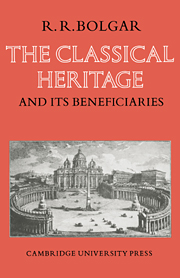Book contents
- Frontmatter
- Contents
- Preface to 1973 impression
- Introduction
- Chapter I The Background
- Chapter II The Greek East
- Chapter III The Carolingian Age
- Chapter IV The Pre-scholastic Age
- Chapter V The Scholastic Age
- Chapter VI Collapse and New Beginnings
- Chapter VII The High Renaissance
- Chapter VIII The End of the Renaissance and the Appearance of New Patterns in Classical Education and Scholarship
- Chapter IX Education and the Classical Heritage
- Notes
- Appendix I Greek MSS. in Italy during the Fifteenth Century
- Appendix II The Translations of Greek and Roman Classics before 1600
- Index
Appendix I - Greek MSS. in Italy during the Fifteenth Century
Published online by Cambridge University Press: 29 January 2010
- Frontmatter
- Contents
- Preface to 1973 impression
- Introduction
- Chapter I The Background
- Chapter II The Greek East
- Chapter III The Carolingian Age
- Chapter IV The Pre-scholastic Age
- Chapter V The Scholastic Age
- Chapter VI Collapse and New Beginnings
- Chapter VII The High Renaissance
- Chapter VIII The End of the Renaissance and the Appearance of New Patterns in Classical Education and Scholarship
- Chapter IX Education and the Classical Heritage
- Notes
- Appendix I Greek MSS. in Italy during the Fifteenth Century
- Appendix II The Translations of Greek and Roman Classics before 1600
- Index
Summary
The evidence used in this appendix comes from three sources of unequal value.
(a) Some existing manuscripts are marked in such a way that we know them to have been in fifteenth-century Italy. They are signed by the men who copied or owned them, or they carry other indications of their early wanderings. These marked manuscripts have been objects of interest to scholars for the past two hundred years. Francesco Barbaro's have been noted by Mittarelli, Filelfo's by Omont, Constantine Lascaris's by Iriarte, Leoni's by Dorez, Manetti's by Stevenson, Lorenzo dei Medici's (rather uncertainly) by Mueller, Niccoli's and Vespucci's by Rostagno, and Rudolf Blum has recently traced in the Laurentian Library over fifty codices which had once belonged to Antonio Corbinelli. Where such identifications can be made, we are on firm ground. We have the name of an owner and an exact knowledge of what he possessed. Unfortunately however the manuscripts in question are relatively few in number.
(b) To complete our picture we have to turn therefore to information of a less satisfactory kind. We have to consult the book-lists and catalogues of the period, which tend to provide only vague indications of what each manuscript contained. More often than not, they give only the author's name or some indefinite title like ‘dialogues’, ‘speeches’ or ‘plays’. Moreover, only one of these lists refers indisputably to the first half of the century. This is an account of the manuscripts possessed by Aurispa in Rome during July 1421, which was found by Omont in Cod. Leid. gr. 48. Published in the Centralblatt für Bibliothekswesen IV (1887), it has been reprinted in Sabbadini's edition of Aurispa's letters.
- Type
- Chapter
- Information
- The Classical Heritage and its Beneficiaries , pp. 453 - 505Publisher: Cambridge University PressPrint publication year: 1973



